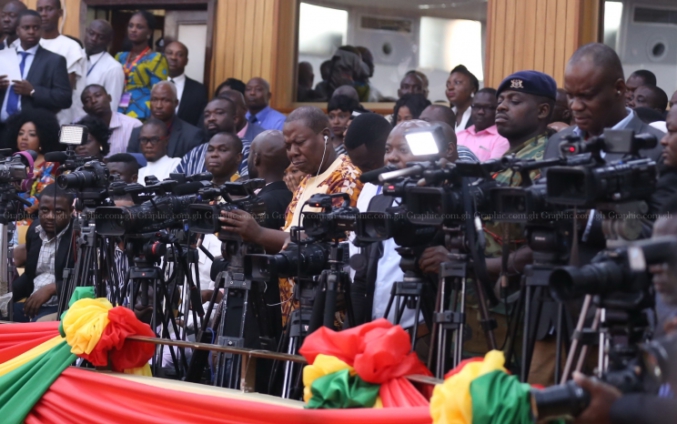The State of the Ghanaian Media Report 2023 says the Ghanaian media is not financially viable.
According to the report, “the media industry is too heavily plagued by saturation, the cost of doing business in Ghana, dwindling advertising budgets [including capital fight onto social media platforms], the after-effects of the COVID-19 pandemic and fast-evolving technological changes to be considered financially healthy.”
The study noted that the financial health of the local media is patchy, at best.
It added that although there are clear signs of healthy indicators of financial potential, there are equally pressing challenges to viability.
“Factors situated within the structure of the local media scene, the COVID-19 pandemic, the state of the local economy and the fast pace of technological evolutions both hurt the financial health of the media in Ghana.”
It went on to state that while media strive to be financially viable, the efforts are also countered by the cost of doing business in Ghana’s post-COVID-19 economy.
“Like all businesses in the country, media organisations are finding themselves at the mercy of forex rate-induced rising fuel, utility and retooling costs which have become a constant drain on incomes. As these and other costs increase, the capacity for media to adequately resource and remunerate employees to engender professional practice reduces.
“The high cost of doing business also has implications for content diversity. Indeed, as we find, it costs more to generate local content than to import and do voice translation sound inserts. This explains the increasing levels of imported Asian and Southern American telenovelas which are gradually weaning local audience tastes off local films and drama. The long-term implications for financial viability are dire.”
According to the report, although the media encounter financial challenges, it is not helpless to the challenges they face, because they are resorting to innovative revenue strategies to turn the tide.
The innovative revenue strategies that media resort to augment their revenues are derived from non-advertising sources. The strategies relate to content innovations, digitisation, diversification and innovative solicitation.
Meanwhile, the report recommended ways by which the media can take to ensure it is financially viable.
For media organisations:
- Cost-cutting measures such as working from home [with savings in utility consumption and transport budgets] deserve larger-scale adoption by media organisations to reduce their costs and increase their financial viability.
- Media organisations must also continue to innovate new revenue strategies to reduce their heavy reliance on advertising revenues, a model that is increasingly threatened by the influence of global social media giants.
- An important way to ensure viable media is trust and credibility… Media organisations must guard their credibility. High editorial standards must be maintained to avoid the risk of serious media evolving into tabloids in an effort to garner the attention that generates income.
- The media must keep looking at the digital.
For media development organisations
- Capacity building to enable media organisations, particularly smaller, rural-based ones, to diversify revenue sources and strategies was recommended.
- The NCA should, as a matter of urgency, consider freezing the issuance of more broadcast licenses and take steps to audit and restructure the broadcasting space to reduce the glut and improve the financial prospects of media organizations.
The State of the Ghanaian Report is a study conducted by the Department of Communication of the University of Ghana and the Media Foundation for West Africa (MFWA).
The launch of the report on Wednesday was part of the activities marking the 50th anniversary of the Communication Department.
Latest Stories
-
CLOGSAG vows to resist partisan appointments in Civil, Local Government Service
42 minutes -
Peasant Farmers Association welcomes Mahama’s move to rename Agric Ministry
44 minutes -
NDC grateful to chiefs, people of Bono Region -Asiedu Nketia
46 minutes -
Ban on smoking in public: FDA engages food service establishments on compliance
47 minutes -
Mahama’s administration to consider opening Ghana’s Mission in Budapest
49 minutes -
GEPA commits to building robust systems that empower MSMEs
51 minutes -
Twifo Atti-Morkwa poultry farmers in distress due to high cost of feed
54 minutes -
Central Region PURC assures residents of constant water, power supply during yuletide
55 minutes -
Election victory not licence to misbehave – Police to youth
56 minutes -
GPL 2024/2025: Nations thrash struggling Legon Cities
59 minutes -
Electoral offences have no expiry date, accountability is inevitable – Fifi Kwetey
59 minutes -
Ghanaians to enjoy reliable electricity this Christmas – ECG promises
1 hour -
Police deny reports of election-related violence in Nsawam Adoagyiri
1 hour -
‘We’re not brothers; we’ll show you where power lies’ – Dafeamekpor to Afenyo-Markin
1 hour -
EPA says lead-based paints are dangerous to health, calls for safer alternatives
3 hours

